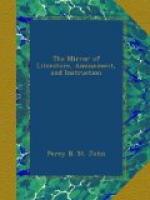“’And this is the way you generally spend your evenings?’—’Always, except when Francois has to go to Vaugirard at four o’clock: then he must go to bed earlier. Perhaps you do not know that our burying ground is at Vaugirard: as that burying ground is not much in fashion, we have been allowed to retain our privilege of having a fosse to ourselves.’
“‘I understand,—it is a fief of the Morgue.’
“’You saw that chariot below near the entrance gate, in which the children were hiding themselves at play,—that is our hearse.’
“’And rich or poor, all must make use of your conveyance? If for instance a suicide is recognised, his relations or friends may reclaim him, take him home, and bestow the rites of sepulture on him at his own house?’
“’No, the Morgue does not give back what has been once deposited here. It allows the funeral ceremonies to be as pompous as they will, but they must all set out from hence; one end of the procession perhaps is at Notre Dame, while the other is starting from the Morgue. The Archbishop of Paris may be there; but Francois’s place is fixed. It is the first.’
“’And the priests of Notre Dame, do they never make any difficulty about administering the funeral rites to your dead?’
“‘Never!’
“‘Not even to the suicides?’
“’There are no suicides for Notre Dame: one is drowned by accident, another killed by the bursting of a gun, a third has fallen from a scaffold. I invent the excuse, and the conscience of the priest accepts it. That’s enough.’
“So, thought I! Notre Dame, which formerly witnessed the execution at the stake of sorcerers, alchymists, and gipsies on the Grande Place, has now no word of reprobation for the carcass of the suicide, once allowed to rot on the ground, or be devoured by birds. She asks not here what was his faith. The priest says mildly, ‘Peace be with you.’
“We walked down, and Francois opened the first room, that which contains the dresses; habits of all shapes, all dimensions, hideously jumbled together; gaiters pinned to a sleeve, a shawl shading the neck of a coat; dresses of peasants, workmen, carters and brewers’ frocks, women’s gowns, all faded, discoloured, shapeless, flap against each other in the current of air which entered through the windows. There is something here appalling in the sight and sound of these objects, soulless, body-less, yet moving as if they had life, and presenting the form without the flesh. Your eye rests on a handkerchief, the property of some poor labourer, suddenly seized with the idea of suicide, after some day that he has wanted work.
“Francois, who followed the direction of my eyes to see what impression the picture produced on me sighed heavily.
“‘Does it move you too,’ said I? ’Are you discontented with your lot.—Unhappy?’
“’Not exactly! But, Sir, formerly, you must know, the dresses, after being six months exhibited, became a perquisite of ours; we sold them. Now they talk of taking the dresses from us.’




